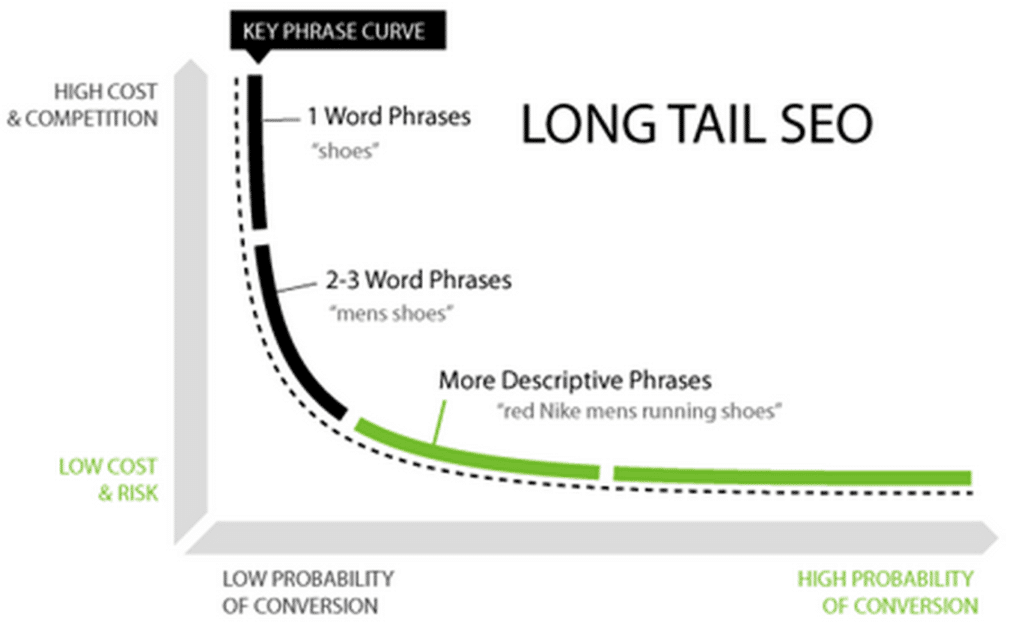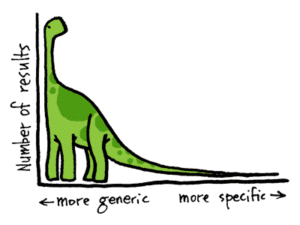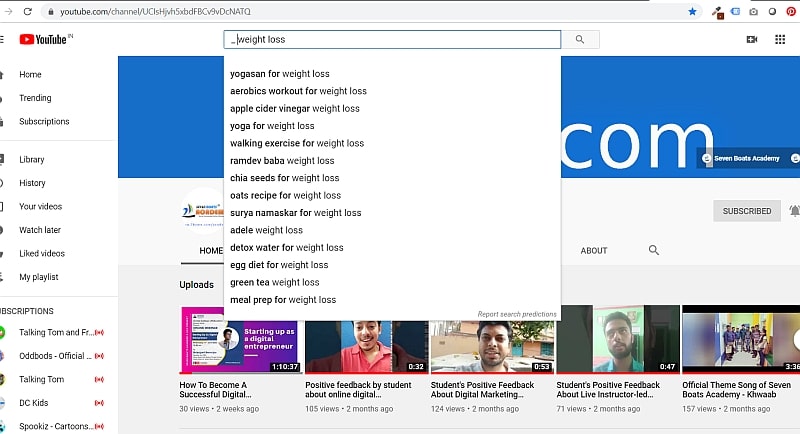
The Importance of Keyword Research in SEO
What is a keyword?
A keyword or primary keyword or focus keyword, is a word or a phrase that describes the content on your web page or post the best. It is the search term that you want your specific page to rank for. So when your target audience search for that keyword or phrase in Google or any other search engines, they should find that specific page of your website.
What is keyword research & how important it is for SEO?
Speaking of keyword research, it is indeed the life support system of online marketing. Though it involves some kind spying over your visitor’s search behavior, digging up such terms and phrases (and to target them correctly later on) is the most critical job for achieving higher search ranking. In short, keyword research is the study of your visitor’s search behavior that helps you to make a strategic marketing plan to increase your return on investment.
An accurate keyword research on the specific industry lets you understand and (even) predict the market scenario, including the shift in the demand and change of market trend. It helps you to understand the facts that motivate your visitors to become a buyer. Thus, you can come up with products and services that your visitors’ are actively searching for. This, in turn, will help you to increase your overall sales and market exposure.
However, you need to target the realistic keywords that help in the conversion in your niche market. And this is where the long-tail keywords come in use. For example, you have car repairing business and serve the local market. Will it be of any use to target for keywords like “Car Repairing” or “Car Repairing Service” to rank internationally?
Of course not, what you need is the top ranking in your niche market. This way, you are being specific to the market that you are serving and is also geo-targeting your potential visitors. Thus, “Car Repairing Service in Seattle” will be a better choice of keyword, if you are a Seattle based car repair company.
Another reason why I prefer long-tail keywords is the limitation in time and resource, at least in the initial phrase. They are specific, geo-targeted, and less competitive. In other words, it’s much easier to optimize your site with long-tail keywords that help you to obtain relevant visitors. However, there is no-way I am saying short-tail keywords are not worth investing.
They help you to gain a global exposure if you can manage to gain higher search ranking, but they are time-taking and expensive as well. The trick is to combine the short-tail keyword into your long-tail keywords strategically to pull amazing number of search per month. For example, “Car Repairing Service in Seattle” or “Cheap Car Repairing Service in Seattle” is a keyword that includes that much-searched short-tail keyword, nevertheless being more specific.
Never limit your keyword research only to your competitors’ website. They are important, but also focus on the most searched terms/ keywords in your Google Analytics. In addition, there is the traditional way of finding keywords – the online keyword suggestion tools.
Also, communicate with your existing and potential clients through web chat, social media, reviews, and forums to find more such associated words or phrases for your products. All these sources will provide you with some keywords that ensure the maximum possible coverage for your product and services.
Keyword Research Techniques & Keyword strategies
Download the keyword research technique PDF guidebook for your handy reference.
Keyword research Video tutorials
Any good SEO campaign starts with keyword research. After all, if you don’t know what keywords people are searching for, it will be difficult to optimize your website for the search engines. There are a number of different ways to do keyword research, but some methods are more effective than others. One popular method is to use a keyword research tool such as Google AdWords Keyword Planner. This tool allows you to enter a seed keyword and get ideas for similar keywords that people are searching for.
Another method is to simply ask people what keywords they would use to search for your product or service. This can be done through surveys or by asking people in forums and online communities. Whichever method you choose, make sure to do your research thoroughly before proceeding with your SEO campaign.
What is a keyword? (Video tutorial)
How to do keyword research? (Video tutorial)
User intention or keywords which one to choose?
How to do a keyword research [Infographic]
Step-by-step guide to keyword research / keyword analysis.

Hitting the Right Notes in Keyword Strategy
Keywords, as the cliché goes, are the building blocks of your website, or your entire online marketing initiative practically. So, it becomes all the more important to pick the right keywords in order to face up to the competition and then go beyond it. To pick our keywords, we rely on keyword tools that give us a set of keywords. On probing further, you also get the search volumes against each keyword in your domain.
While generating content or SEO strategies, you depend on these high volume keywords. That’s mistake number 1.
High volume keywords will face stiff competition from other players in your domain of interest. It is a much wiser idea to optimize your website by using keywords with a comparatively lower search volume. On doing so, you are more likely to grab the top slots on search engine results than by using keywords with higher search volumes.
Another myth that needs to be burst here is that high volume keywords generate online traffic. They don’t. They are generalized keywords whose effects get diluted over a wide spectrum of online visitors. You will score better with low volume keywords.
Another common mistake that SEO strategists make is to use the same keywords to optimize every web page on your website. This actually pitches web pages of the same website against each other to come up on SERP lists.
A far better idea would be to pick different keywords for separate web pages. Allow individual web pages enough breathing (and fighting) space to have a shot at the SERPs. It would also drive higher traffic to your website if the different web pages of your single website cater to the search results of different sections of online users. If you look at it holistically, your entire website will then be able to cover a wider area to soak in online traffic.
Lastly, look at relevancy when picking keywords. A keyword with ideal assets to shore up online traffic may not work for you simply because it is not relevant to the web page that you are optimizing. On the other hand, a keyword with less impressive track record but one that fits your web page to the T will prove to be a better bet. It is true that monthly search volumes certify the performance of a keyword but do not bring it into your scheme of things if it does not pass the litmus test of relevancy.
7 Insights of Keyword Research

If you want to make it as an online business, solid keyword research is essential to best plan out content creation, placement, and promotion. Unfortunately, many businesses don’t take the time to conduct proper keyword and may crash and burn because of it. Fortunately, to help improve your business, here are 7 insights of keyword research:
1. Creating a list of keywords.
Choosing the right keywords for your webpages is the key to attracting the right kind of audience. One simple way to determine what kind of keywords you need is to look at your webpage and describe it in three to five words. Once you have a number of combinations to work with, they can possibly be used as keywords.
Use long tail keywords and also do keyword stemming [Keyword stemming is a useful way for web pages and search engine optimization. The process of keyword stemming involves taking a basic but popular keyword pertaining to a particular website and adding a prefix, suffix, or pluralization to make the keyword into a new word]
2. Selecting and using a reputable keyword research tool.
Many people rely on the Google Keyword Planner (previously known as the Google AdWords Keyword Tool) because it is free and simple to use. However, you can also use paid tools with more advanced features such as the Bruce Clay, Inc. SEOToolSet , UberSuggest and WordTracker.
3. Utilizing the keyword suggestions to narrow your keyword list.
Many keyword tools will provide you with a list of suggested keywords based on the keywords you originally use. Checking out the suggested keywords is an excellent way of finding even more valuable keywords and phrases that you otherwise would have never known about.
4. Determining if the keywords accurately describe your content.
When creating content, it is essential that you only use keywords that accurately describe the content. If you try to use unrelated keywords to rank, both Google and your audience will not appreciate the fooling attempt. In fact, you should only focus on one to three relevant keywords per page.
5. Determining how many people actually search for certain keyword phrases.
When focusing on keywords, you need to determine exactly how people phrase the search terms. You can refer to the Average Monthly Searches column in Google Keyword Planner for a general idea of what is being searched for in Google. However, tools like the SEOToolSet or UberSuggest can show you results in Google, Yahoo, and Bing for the best results.
6. Checking out the competition.
If you want to become an authority for certain topics and keywords, you need to check out the competition. By typing your keywords into a search engine, you can easily see what sites you have to compete against. If the top matches are authority sites, you may have a more difficult time ranking for certain keywords.
7. Keeping up-to-date about the latest practices.
To prevent your site from being penalized for using black hat techniques, it is important to keep up-to-date with the latest acceptable white hat SEO practices. Fortunately, if you want to free up some time, you can find a SEO partner to keep up with the trends. Also you need to avoid keyword cannibalism on your website . [Writing multiple similar topic content targeting with similar or same keywords that will rise internal competition among your pages and you will lose ranking. ]
Learning all about how to properly conduct keyword research is essential for helping your online business to grow. By taking in these 7 insights, you can create a firm foundation to build your keyword research practices upon.
Top 3 Keyword Ideas you must Dump

Keywords form the backbone of all SEO efforts. That is why there has to be a lot of research to draw up the list of keywords that you are going to use. SEO professionals know this and actually do spend a lot of time in keyword research. However, with more research and options come some dumb moments when despite the best knowledge, wrong keywords seep into usage. These wrong keywords can derail your SEO drive and even be counter-productive. Here are the top 3 keyword ideas you must dump:
- Single Words: Single words acting as your keywords can be a dangerous proposition. The only exception is if these single words are very niche words. Single words acting as keywords usually gets in a high number of online visits must the bulk of this volume is irrelevant traffic. The conversion rate is very low. Even searchers who use single words as keywords end up revising their search because the results are all over the place and quite intimidating too! As an SEO unit, you have to steer clear of single words as keywords.
- Generic Keywords: Keywords with a broad horizon is usually low on ROI. There are too many visitors coming to your website without actually being buyers because they are not sure if you sell what they want. For example, if you are selling fiction books, your keyword should not be ‘books’. You need to be more specific. False descriptors about what you are offering can mislead online visitors and also eat up your resources to get the SEO job done without actually giving anything of value. Use the search box yourself. If your keywords turn up the searches your brand caters to, it’s a good keyword. Otherwise, it’s not!
- Competitive Keywords: Keywords that come with a lot of competition is not your cup of tea, especially if you are a startup or an SEO team with limited resources. Heavily competitive keywords can pull you into a long drawn game with no conclusion in sight. Instead of picking such keywords in the hope of higher traffic, target the less competitive ones. Use the heavily competitive ones as a second option. That will ensure that you get quicker SEO results and also pitch yourself in the long haul.
The Trick Guide to Understand Long Tail Keywords

In response to a post on long tail keywords sometime back, I got some queries on how to use them more effectively.
Before sinking into this question, let me make a few observations about long tail keywords. For starters, you need to understand that more often than not, you will not get substantial ideas on long tail keywords from the usual keyword research tools. The reason is simple: for most long tail keywords, there is not enough search volume to map out any data.
Let me stretch it out for you. If you search for generic keywords, like ‘socks’, the search volume available is astonishingly high. As you can well imagine, the competition to rank on these keywords is very high. Most number of searchers uses these keywords. However, when you get into specifics and try long tail keywords, like ‘polka dotted blue and white socks’, the number of searches is abysmally low, even on a monthly scale.
Because of such low data, keyword research tools cannot provide you any information or stats. This makes long tail keywords a kind of guesswork. You need to figure out for yourself what the long tail keyword can possibly be. Now the question popping up in your mind is, why bother? The search volume is low anyway! The answer is, the few searchers on long tail keywords are usually strong leads. The conversion rate is jaw-dropping high. So, you cannot ignore the mechanics of using long tail keywords.
The math is quite simple. With a landing page dedicated for each long tail keyword, you will be able to generate more sales than having hundreds visiting your site through generic keywords and more than 90% of them slipping away. I think it’s wiser to invite 10 potential leads and close the sale on 7 of them than bear the expenditure of marketing to 100 potential leads and then closing deals on just 20 of them. Long tail keywords give you this conversion advantage.
Not targeting long tail keywords mean you are gunning for the generic keywords. That demands an entire SEO machinery at work! It includes more content publication and leakage through the marketing funnel. With more people in the arena, you will be sorely hard-pressed to manage them all, especially when you realize that maybe none of them are particularly interested in buying anything from your portal. It is quite a sad situation to be in!
Instead, a better choice is to work in a niche marketing segment. You cannot have all. There is no point in proliferating matters when you cannot control them. Finding a niche can cut down on the number of searchers anyway. You can go into more specifics by opting for long tail keywords. Suddenly, the competitive arena has shrunk and you have fewer people on the deck but almost all of them are actually interested buyers.
Targeted marketing opens up like never before. You can try out PPC campaigns on these long tail keywords that belong to a niche market. The double whammy makes your PPC ads quite specific to users. It also cuts down your cost incurred because unwanted people are not even seeing your PPC ads on their screens through searches, let along click on them for no value addition to your business.
When I say that you have to steer clear of most keyword research tools for long tail keywords, I’m not asking you to abandon research completely! You can try the Keyword Explorer of Moz or KeywordTool.io. There are others like SearchMetrics. AdWords, the accepted keyword research tool cannot help you because it does not show you keywords with zero search volume, which is the case for long tail keywords. However, the tools I mentioned here provide you with keyword ideas, irrespective of their search volumes.
There is another tack that you can try out: targeting long tail keywords at random within the construct of your business domain. In this case, you can no longer going for specifics but through content, you are trying to cover everything under your business domain. A good way to do that is through user-generated content, where users end up optimizing long tail keywords without realizing it!
Why Long-Tail Keywords are a Better Idea
There was a time a couple of years back when long-tail keywords were very much in vogue. SEO experts found that it takes lesser time to grab ranks on search engine results with the use of long-tail keywords because the competition is much lower. That period gave way to a state of dormancy when the SEO world forgot all about long-tail keywords!
In the recent times, however, these long-tail keywords are making a strong comeback. Startups and small business firms are finding it better to use long-tail keywords to make quicker, often better, impact on search engine results.
Why are long-tail keywords working? The answer lies in the psychology of the user who keys in the words in a search engine box. Users treat search engines as answering tools rather than dictionaries. That is why they are more likely to type in questions rather than terms and jargon.
For example, a user is more like to key in “How to convert Fahrenheit to Celsius” rather than “Fahrenheit to Celsius”. The former is a long-tail keyword that the user feels will take them to the answer quicker. That is where long-tail keywords work better from the perspective of the user. Moreover, mobile searches now allow voice inputs to users. Here too, users ask a full question rather than some specific words.
From the SEO point of view, there are two major advantages of targeting long-tail keywords. One is already mentioned above: lesser competition. With most of the competition targeting keywords like “Fahrenheit to Celsius”, you can grab the SERPs on a long-tailed keyword like “How to convert Fahrenheit to Celsius”.
This is an easier route to SEO success because it matches the search queries generated by the user. Another advantage is that long-tail keywords allow SEO team to offer relevant searches to users. With the long-tail keyword, you can specifically give users exactly what they are looking for. Your conversion rate improves drastically because users are getting what they want at the very first search!
There will, of course, be more people who use the conventional keywords for their searches. You cannot turn a blind eye to that. But using long-tail keywords will get you better returns when you are running on a constrained budget or looking for a toe-hold in the domain. Once you get some traffic coming through the long-tail keywords, you can target the conventional keywords.
How to Optimize for Long Tail Search

In their bid to attract customers many businesses chase search phrases used by lots of people. I’m talking about phrases such as ‘car insurance’. These could be thought of as headline search phrases.
The problem with this approach to securing web traffic is the competition for these headline search phrases is often intense and website owners can spend a lot of time and money chasing them, often for little or no return. In short the competition is just too stiff.
So what to do?
Along with headline search phrases there are many more search phrases used less frequently but when added up their total exceeds those of the headline searches. This is referred to as the long tail of search but let me explain by using our earlier example of ‘car insurance’.
Let’s say there are 2000 searches every day using the term ‘car insurance’. Along with these searches there will be searches such as ‘need to insure my car’ or ‘cheap way to insure my car’. Added together these long tail searches represent the majority of searches relating to car insurance.
These phrases are not referred to as long tail because they are long, they are referred to as long tail because they are used infrequently. It’s perfectly possible for a long tail phrase to be short!
At this point you might be thinking the way forward is to find lots of long tail search phrases and create pages optimised for them. You’d be wrong. This is a common misunderstanding with respect to long tail search and although some people believe this approach is valid I’m not one of them, and this is why.
By definition long tail search phrases are not used very often. If a phrase is used often it’s not a long tail search phrase, no matter how long the phrase might be. Remember, the term long tail doesn’t refer only to the length of the phrase!
So by now I’m hoping you are wondering just how you can include a long tail strategy in your search marketing efforts.
The secret to securing long tail search traffic is simple, it’s content, lots of content.
By creating lots of great content you will be using lots of long tail search phrases naturally. This doesn’t mean you should be researching long tail phrases and adding them to your content in the way you might if you were chasing headline search phrases, it means you should just write naturally. By doing this you will use phrases people use when searching and over time your pages will attract search traffic.
Be careful about topics. Group your keywords based on the topics and don’t write multiple similar content on same topic using similar keywords. Topic based page (Long-form content)->group similar topic related keywords into it -> link specific more explanatory pages from it (Short or average length specific to that sub topic) -> put specific sub topical keywords for that specific explanatory page.
This approach to search marketing requires commitment. You need to decide you want to add some value to the subject you’re involved with, but it’s a strategy that will not only send you valuable traffic, it’s widely accepted long tail traffic can be extremely valuable, but it will also build your site’s perceived overall value and authority.
In a competitive on-line world a long tail strategy is well worth considering and hopefully this information will help you to create a successful one.
Google Adwords for Keyword Identification

Google Adwords is a treasure house of information about keywords, the building blocks of your SEO campaign. However, there are only a limited number of websites that make proper use of Google Adwords, despite recognizing the value of this keyword research tool in the context of SEO in search engine giant Google. In this post, we shall look closely at some of the ways in which you can draw more benefits from Google Adwords. Read on!
The first step in your search for the ideal keywords on Google Adwords is keyword identification. In this step, you need to get a detailed idea of what the users are searching for in your domain. The keyword ideas offered by Google Adwords are based on the summation of these searches picked up from Google. All you have to do is enter the name of the website you want to optimize. The Adwords tool will come up with a list of relevant keywords in your domain. This is the easiest way to build up a list of keywords that work for your website. In fact, you can easily get a close look at the keywords being used by your competitors!
Other than using your website URL for keyword identification, you can use your domain of interest as well to look for keywords. For example, if you are working as a florist, you can enter the word ‘flower services’ in the box and obtain a list of generic keywords that are relevant for your industry. Of course, this is not really the keyword tool that you are looking for if you want some serious keywords for your business. Searching for keywords on Google Adwords through this process will throw up generalized keywords that apply for all businesses in this domain and not for your specific need.
The third, and most accurate and precise of the three methods of keyword identification, is to use a seed phrase and look for permutations and combinations with that particular phrase. The keywords projected by the use of this method are closer to what you need for your particular website. For example, if you type in your brand name as ‘Mojo’, the keyword list will contain words with this particular seed phrase, tallying the word against searches made with this phrase. You can use the exhaustive list for your SEO.
Why Your Keyword Research Needs to Change Now
Keyword Research – Maintaining a status quo is probably the easiest way for any business to run itself to the ground!
Doing the same routine, following the same strategies and sticking to the same procedures do not come off in a dynamic industry like digital marketing.
This field requires constant changes to happen. For example, the keyword research strategies that paid rich dividends for you back in 2011 may not work so well today. I have learnt this from experience that each year, research and development is a key to success in SEO.
Google AdWords Keyword Planner Tool is not enough
In this post, I will look into keyword research and why it needs to change for your website. If you look at the keywords and want to explore them, the first destination that people head towards is Google AdWords. This is the fulcrum.
Now, the hitch is that AdWords do not always show the correct facts about volumes of different keywords. I’m not suggesting that Google is keeping you away from the truth. What is happening is that these stats are not accurate numbers.
These are suggestive figures. Google has clearly written about this in some parts of Google Help on AdWords. When you are getting sample data, you know that you cannot have a keyword strategy that is based entirely on this set of figures.
What do you do in that case? You dig into other platforms! You check through social media, hash tags, discussion boards and QA forums. You tap Google trends. You look at suggested searches and everything in between. What you end up with is a bank of keywords that you had no idea about!
You get insight into the customer’s mind and end up with not just new keywords, but a sneak peek to develop keywords that are more specific and targeted. The good side of this labor of love is that when you feed these keywords into AdWords, they give you stats that open up your perspective on them. This method will work for you just as it has for me.
Metrics, Metrics, Metrics – for your new keyword research
How many times have you heard it being said that picking the right metrics will show you the right path? What I suggest is, other than the usual metric of measuring keywords against their volume, you have some more columns added to the mix.
You can add a metric of Opportunity. This column will tell you what kind of opportunity that particular keyword has to gain leverage and climb up the ladder. This will be determined by the competition around it, the competitors’ view of that keyword and the elbowing in the domain itself.
Similarly, you can create a column for Threat. This will contain a rating on how difficult you feel it is for a keyword to hit the bull’s eye.
Another could be of Value. This is an indication of how much value that keyword will add to your online marketing scheme. A high value keyword, for example, is something that you might fight for and rank while for a low valued one, you can simply let it simmer.
Yet another one could be of Demand. This will give you an idea of what you need to do in order to rank that keyword for your business. It can be through video marketing or Twitter. You can write this is the designated column.
Intention Matters – Keywords with search intent
A welcome departure from the old keyword strategy is that you do need a separate sheet for each keyword. That is cumbersome to maintain and not really necessary anymore. What you need to do is bracket them all under search intent.
This is the broad category that will contain all the keywords that a user may search with to reach the same destination. For example, if a user wants to buy a pen (the search intent), all the keywords used for this purpose can be classified under this search intent. It makes the job so much easy!
The Final Word
With the changing times, keyword research has to change in order to keep up. I have shared my views on this subject. You can write in with suggestions on what should be done to update keyword strategies.
Think Beyond Adwords for Keyword Research – Keywords Tools
Most internet marketers across the world use Google Adwords as their go-to keyword research tool. As a result of the fact that this tool is more popular, using it for your own SEO research may prove to be a little clichéd. It’s time to open up boundaries and look elsewhere. Certainly, there are several keyword research tools available on the internet that can provide you with a comprehensive amount of data to streamline your SEO. Let’s look at the top 3 keyword research tools that take your SEO beyond the confines of Google Adwords.
The Keyword List Generator from SEOBook is one of the 3. Highly effective in drawing up long-tail keywords, the amount of traffic that you generate with the use of the Keyword List Generator may be comparatively low, but what you get will be worth it.
This keyword tool focuses more on quality and provides you with less competitive keywords for your SEO. You can enter up to 5 keywords and modifiers into the Keyword List Generator. The Generator will throw up a number of long-tail keywords for your use. You can have them exported into a CSV file.
CrawlerFX by WebPageFX is the next one. This keyword research tool uses the spider technology and is useful for web-based keyword research and analysis. You can have your website analysed by pairing it with a keyword. CrawlerFX generates a report that can be downloaded as a PDF document or viewed online.
The vast range of areas covered on CrawlerFX is what makes it so popular. You can view various kinds of data like Google Page Rank, anchor text analysis, social media mentions, keyword scores, etc. You can also get your external links examined through CrawlerFX. Experts opine that this SEO tool is much better than some paid tools as well!
The third one on this list is the Competitors Research by SEMRush. This keyword tool is fantastic if you are looking to access the competition in your pond. All you have to do is feed the name of your competitor’s website into the little orange box.
The result will throw up a complete SEO analysis of that website, including back-link viability, organic research and advertising data. You can view the SEO analysis of 10 websites for free! By analyzing the competition around you, you can pick up some tips for your own website, other than knowing what the benchmarks are.
The fourth one but one of the best tool is Ubersuggest keyword research tool. You can get lots of insights from this tool.
Related reading: Top 10 free keyword research tools
How to Do Keyword Research for YouTube Videos
YouTube Auto-Suggest Feature
Just like Google instant or Google auto suggest feature, you just need to go to YouTube.com and in search box whenever you start typing it will show you suggestions. Use those related suggested keywords.
Underscore Technique in YouTube Search Box
First, type a keyword in the YouTube search box
But, don’t press enter.
Now, put an underscore (“_”) and one space before your searched keyword.
See the result and note. You will get some great keyword ideas.
Competitors’ Most Popular Videos
Go to your competitors channel and sort their YouTube videos by “Most Popular”. You will get fair ideas about what type of title, description and tags they are using.
Competitor’s Ranking Video Tags
- Install the Google chrome extension -> Tags for YouTube
- Open youtube.com in chrome and search any popular or ranked video in your niche
- Click on the video
- You will see a “show more” link. Click on that and you can see the list of tags they are using.








Keyword research is so much important to create a website. For this, your article is helpful to research techniques and strategies to choose a keyword.
Thank you.
Thank you Colour Bangla Team.
While searching in Google about the Importance of Keyword Research or looking for Keyword Research Tool helped me to land on this page. Having a brief idea about the keyword . Analyzing the keywords and its broad scope gave me a clear idea to make the proper use and implementation of the right keyword in the most effective manner.
THANK YOU!
Thank you Vivek that you liked this keyword research guide. As a beginner to keyword research you can follow the below steps –
Step 1: Make a list of important, relevant topics based on your business.
Step 2: Fill in those topics with related keywords.
Step 3: Research related search terms from Google.
Step 4: Check for a mix of head terms and long-tail keywords in each topic.
WOW!
Once again thanks a lot ..
Very informative content! I recently started a blog and keyword research, as we all know has been the toughest task for beginners like me. This article definitely does a great job of breaking things down in a much simpler way. The idea of combining short-tail keywords with long-tail keywords strategically to increase search results was something that I found really interesting. Thank you for sharing.
Thank you Anupama for your comment. Yes initially for beginners this may look a bit tricky but once you practice it for some time, it will be very interesting. Keyword research is foundation of SEO and inbound marketing. Find below the steps how to do keyword research –
Step 1: Study your niche / industry / segment.
Step 2: Define your objectives.
Step 3: Make a list of relevant topics.
Step 4: Create a list of primary keywords.
Step 5: Use good keyword research tools.
Step 6: Study the users’ search intent.
Step 7: Identify long tail keywords.
Step 8: Find out about your competitors.
Step 9: Keep all related keywords specific to a particular topic in one place and avoid keyword cannibalism (multiple topics or content or pages on same or very similar keyword)
Great information. Summarized my understandings below. Correct me if I’m wrong. Thank you in advance.
1. Simple goal of keyword research is to find out what your target audience is searching for
2. Target users’ intent first
3. Find words and phrases / sentences that people use in search engines
4. Find long-tail keywords with low SEO difficulty
5. Use tools like Google Ads Keyword Planner for SEO keyword research
6. Analyze the actual search terms
7. Based on these keywords write useful and high-quality content
Thank you Laqsh. Excellently summing up. Yes that’s it. Additionally you can analyze your competitors’ keywords as well.
Noted. Thank you so much
Before summing up this, I would like to tell why “keyword” is important for a business online.
Whenever you want to search for anything you type keyword in google search and get the result. To attract the customer online you must have a keyword that generates lead. Now, coming to the summing up part-
1) Use long-tail keyword- Long tail keyword is specific and easily a customer can find your site online but only having long keyword it is not called a long keyword. The keyword which is used infrequently is also called a long-tail keyword.
2) A good keyword should describe what is in the content.
3) “Google keyword planner” is good and extensively used tool for keyword research. It also tells how many people are using that particular word in google.
4) Avoid keyword cannibalism- to check use SEMrush tool.
Thank you Kishor. Excellent points to follow for keyword research. Though I personally prefer manual keyword research first before using any tool at first go. Once my manual research is done, I usually try various tools and reform / fine tune my long tail keywords.
Thanks for mentioning Long Tail search this was very useful information
Thank you
keep blogging always and good work
Thanks
Excellent information! Very helpful post thanks for the info.
Thank you
Excellent information! Very helpful post. Thanks for the info. I’m always up for learning something new!!
Thanks Sonu for your encouraging words
Very helpful. Excellent information! This breaks things down in such a simple manner. Short-tail keywords combining with long-tail keywords to increase search results were useful information I would like to try out.
Great. Sure, try it and don’t forget to share your result. Would love to hear from you. Thanks.
Very thorough and complete information about Keyword research and SEO. Dividing the topic into several pointers really makes it more interesting and understandable.
Thank you
Finding the right keyword can make or break your business nowadays. I gained so much knowledge reading your article on keyword research. I am soon launching my new website and was searching for some quality information about keyword research. Glad I found your blog and website.
Thank you Sunil. Best wishes for your new website.
Thanks for the amazing and valuable content for the free. This is really very helpful and effective for me and lots of startup businesses.
Thank you Mr. Sur for your kind words. Best wishes.
I Properly go through these above pages , that is quite easy to understand and this is beginning time for me as a digital marketer that’s why this information give more benefit to me and I got detailed knowledge about Keyword research. Thank you so much sir for give this guidance.
thanks a lot for this content its really helpful and I am absolutely follow this
In today’s world, finding the proper term can make or ruin your business. Reading your article on keyword research provided me with a wealth of information. I’m planning to create a new website and was looking for any good keyword research information. I’m glad I came into your blog and website.
Keyword research and optimization is a really important aspect of digital marketing because it gives an intial idea about the business to the customers. The simple language used really helps in making beginners understand just how important keyword research is.
thank you for sharing such vital information on Keyword research which can tell you what terms people are actively searching for, and the competitiveness of those keywords, and help guide your content marketing plan to increase organic search visibility, rankings, and traffic. your blogs are really helpful.
Keywords are very important to ranking a page.This article helps me understand how to use keywords such as long-tail keyword value, keyword research, keyword planner, competitor research, etc. Thank you, 7boatsacademy
Keyword research is very much important part of digital marketing it will provide vital information to grow your business online this content is very much informative thank you 7boatsacademy
Great article on keyword research! As someone who works in digital marketing, I couldn’t agree more with the importance of understanding your audience’s search habits and identifying the right keywords to target in your content.
I particularly appreciated the emphasis on not only focusing on high-volume keywords, but also considering long-tail keywords and incorporating them strategically in your content. It’s all about finding the right balance between relevance and search volume.
Another important point is the need to continuously monitor and adjust your keyword strategy based on changes in search behavior and competition. Keyword research is an ongoing process, and it’s important to stay up-to-date to ensure your content remains visible and relevant.
Overall, this article provides valuable insights for anyone looking to improve their keyword research skills and optimize their content for search engines. Keep up the good work!
“Great blog post! Keyword research and analysis play a crucial role in optimizing a website for search engines. This comprehensive guide provides valuable insights on how to effectively conduct keyword research. The step-by-step approach and practical tips make it easy to understand and implement. I particularly appreciated the emphasis on finding relevant and high-volume keywords that align with SEO goals. This post is a valuable resource for anyone looking to improve their SEO strategy and drive organic traffic to their website. Thank you for sharing these valuable insights!”
Your blog on keyword research and analysis is fantastic! Your tips and insights have given me a clear understanding of how to optimize my content effectively. Keep up the great work, and I look forward to more valuable insights from your blog!
Amazing Post.